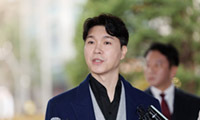▶ ROGER COHEN
These things happen. At least they happen in the empowering digital age, and they happen to Glenn Greenwald.
With his gray shirt, black backpack, regular features and medium build, he merges into the Rio crowd, the ordinary man. Over a Thai lunch, he tells me he is sleeping five hours a night, running on adrenaline. So what does he do to relax? “Roll around in the mud with my 10 dogs.”Unwinding is hard. The five months since he met Snowden in Hong Kong have been relentless; they talk almost every day. He lives in limbo. “I feel like if I went back to the United States there is a more than trivial chance I would be arrested,” he says. “Not one of 20 lawyers I have spoken to has said, ‘Oh, you are being paranoid; of course they would never think of arresting you.’ ”Would Greenwald enjoy First Amendment protection after publishing top-secret information? The record of the Obama administration is ominous. He says his lawyers are unable to get clarification. His mother in Florida asks: “What if I am on my deathbed and cannot see you?”Greenwald lives with a sense of exile but is pesky in his determination not to relent. He has been embraced as a hero by Brazil after revealing American spying on President Dilma Rousseff (who postponed a planned state visit to Washington), but he has resisted one request to hand over documents and is determined, here as elsewhere, to keep his distance from power.
He is on a double mission: to push back in the name of freedom against the post-9/11 “surveillance state” with its dragnet data trawling, and to reinvigorate journalism through “an aggressive and adversarial position to political and corporate power,” an undertaking he will pursue through a new online publication backed with $250 million from the eBay billionaire Pierre Omidyar, the same amount Jeff Bezos of Amazon paid for The Washington Post (a sobering reflection on the standing of legacy newspapers today).
On the first of these fronts, he says he is only halfway through the reporting of Snowden’s documents “with a lot of huge revelations to come.” On the second, explored in a recent exchange with my colleague Bill Keller that will be taught in journalism schools, he has already made about 10 hires. (He and Omidyar have never met, which must be some sort of first for such a venture.)“Our style will be to encourage and empower combative journalism that can be a real force against powerful people,” he says. “We want our journalists to follow their passion.”He continued: “The reason why journalism is important, why it is protected in the Constitution, is to be one of the institutional checks on abuse of power, and for that you have to keep those in power at arm’s length, hold them accountable.”For Greenwald, American journalism has been defanged by the “patriotism compulsion” after 9/11 and by the culture of big media corporations. He alludes to David Halberstam’s speech at Columbia University in 2005: “Never, never, never let them intimidate you. People are always going to try in all kinds of ways. Sheriffs, generals, presidents of universities, presidents of countries, secretaries of defense. Don’t let them.”Of course, this admonition is sacred to plenty of old-school journalists. Greenwald overstates the conformity of mainstream papers, whose investigative journalism is often vigorous and fearless. But he is right that journalism got engulfed, with grave consequences, in America’s great post-9/11 disorientation. And there is no question that journalism will benefit from having the personal, open-with-its-bias reporting Greenwald proposes alongside the impartiality-seeking traditional media. “Biased and balanced” — the Andrew Sullivan blog formula — is an important component of the new media landscape. Each form can spur the other, keep it honest.
American society will also benefit from Greenwald’s ongoing revelations about out-of-control surveillance. He has testified before the Brazilian Senate, and should be allowed to testify before the U.S. Senate. He says, “I am definitely going back, I refuse to be exiled for a lie.”He deserves assurance that he can return to the United States without facing arrest.
스마터리빙
more [ 건강]
[ 건강]이제 혈관 건강도 챙기자!
[현대해운]우리 눈에 보이지 않기 때문에 혈관 건강을 챙기는 것은 결코 쉽지 않은데요. 여러분은 혈관 건강을 유지하기 위해 어떤 노력을 하시나요?
 [ 건강]
[ 건강]내 몸이 건강해지는 과일궁합
 [ 라이프]
[ 라이프]벌레야 물럿거라! 천연 해충제 만들기
 [ 건강]
[ 건강]혈압 낮추는데 좋은 식품
[현대해운]혈관 건강은 주로 노화가 진행되면서 지켜야 할 문제라고 인식되어 왔습니다. 최근 생활 패턴과 식생활의 변화로 혈관의 노화 진행이 빨라지고
사람·사람들
more많이 본 기사
- [특파원시선] 외식비 줄이는 미국… ‘30% 요구’ 팁 공포도 한몫?
- 정용진 신세계그룹 회장, 밴스 부통령 성탄절 만찬 참석
- 인도 투어 나선 축구스타 메시…경기장 조기 퇴장에 팬들 난동
- 아이비리그 브라운대서 총격…최소 2명 사망, 8명 중상
- 10석 안팎까지?…내년 한국 지방선거 때 ‘미니 총선급’ 재보선 가능성
- 오세훈 “내집 마련 꿈, 10·15대책에 짓밟혀…규제 완화해야”
- 연말연시 과음 후 속쓰림…단순숙취? “급성염증 신호일수도”
- 변요한♥티파니, 약지에 ‘커플링·포르쉐’..열애 中 티냈다
- 1124일만 선고.. ‘20억 횡령 인정’ 박수홍 친형 결론은?
- 뉴욕 백화점서 아기 기저귀 갈던 엄마, 정신질환자에 흉기피습
- 조미김, 미국 수출관세 ‘면제’됐다…K-김 최대시장서 날개
- ‘김민재 점점 독일 국대에 밀린다’ 독일 현지, 타 향해 연일 찬사... “뮌헨 최고의 영입, 진정한 수비 리더”
- 지선 손 맞잡을까…통일교 특검으로 거리 좁히는 국힘·개혁신당
- 트럼프, 시리아서 IS 공격으로 美병사 사망하자 “강력 보복”
- 한소희, 韓 떠나기 전 의미심장 SN… 1
- ‘아프리카에 당한 기억’ 홍명보, ‘1승 제물’ 남아공 경계했다... 박문성도 “2014 월드컵 악몽 떠올라”
- AI 시장 흔들렸다…챗GPT 독주 속 제미나이 급부상
- ‘손흥민 벽화 3일 만에 그린’ 예술가, SON과 감격 만남 후 “내 아들의 영웅이자 아시아 유산” 찬사
- “다카이치 ‘대만발언’은 對中전략 부재 탓…정상 만나야 해결”
- ‘인니 수마트라섬 대홍수’ 사망자 1천명 넘어…218명 실종
- 김연아♥고우림, 사랑하니 닮아가네..예쁜 커플사진
- 국방부 “시리아서 공격받아 미군 2명 사망…공격범 사살”
- 시리아서 미군 피격, 3명 사망… “시리아군 내 극단주의자 소행”
- 트럼프 “인디애나 선거구 조정 반대한 공화의원들, 교체돼야”
- TV 나와 암투병 근황 공개한 찰스 英국왕… “조기검진 중요해요”
- 트럼프 “인디애나 선거구 조정 반대한 공화의원들, 교체돼야”
- 한화, 호주 방산업체 최대주주 된다
- 소셜연금 NY 2,018달러·NJ 2,190달러
- 신혼부부 ‘역대 최저’ 24%는 3억 이상 대출
- 굽히지 않는 젤렌스키…트럼프에 역제안 카드로 레드라인 저지
- 송지효 “’런닝맨’ 출연 중 8년 ♥장기 연애했다” 폭탄 고백..멤버 모두 ‘충격’
- “엔비디아, 中수요 반영 H200 증산”…일각선 “中, 수입거부할듯”
- 한국 교사 10명, 페어팩스 초등교 배치
- 변요한♥티파니, 결혼 전제 열애 인정
- “귀금속 역사상 가장 극적인 재평가”…올해는 銀이 金 앞섰다 [공준호의 탈월급 생존법]
- 뉴욕증시, 브로드컴 비관론에 AI 테마 ‘와르르’…나스닥 1.7%↓ 마감
- ‘트럼프 골드카드’신청 시작, 100만달러 내면 미 영주권
- 이정후 태극마크 ‘청신호’ 떴다! 스타 출신 SF 사장 “야수보단 투수가 WBC 위험”→걸림돌 사라졌다
- 韓 탁구 최초 역사… 신유빈-임종훈, 세계랭킹 1위+파리올림픽 金 듀오 꺾고 WTT 파이널스 우승
- 선교사 아들 가나대사로 금의환향… “… 1
- 국힘·개혁신당 “통일교 특검 수용하라”…與 “정치공세·물타기”
- 한국도 참여한 美주도 AI 동맹 “비… 1
- ‘오바마케어 보조금’ 올해 말 종료 가능성 ↑ 커져
- 기아 EV5, 넷플 ‘나이브스 아웃’ 협업 캠페인…세계 6개국 진행
- 與, 은행법 처리뒤 ‘경찰관직무집행법’ 상정…국힘 또 필버
- 종묘 일대 세계유산지구로 세운4구역 개발 영향 줄까
- “보안사고 반복 땐 과징금 폭탄”… 해킹과 전면전 선포한 과기부
- ‘양육비 미지급’ 김동성 “내가 月700만원? 통장 압류된 신용불량자”
- 내란특검, 김용현 추가 기소… “HID요원 등 명단 노상원에 넘겨”
- ‘정국 열애설’에 뿔난 아미 ‘워워’..BTS 완전체, 전역→웃으며 연습실 회동 첫 인증샷
1/5지식톡

-
 테슬라 자동차 시트커버 장착
0
테슬라 자동차 시트커버 장착
0테슬라 시트커버, 사놓고 아직 못 씌우셨죠?장착이 생각보다 쉽지 않습니다.20년 경력 전문가에게 맡기세요 — 깔끔하고 딱 맞게 장착해드립니다!장착비용:앞좌석: $40뒷좌석: $60앞·뒷좌석 …
-
 식당용 부탄가스
0
식당용 부탄가스
0식당용 부탄가스 홀세일 합니다 로스앤젤레스 다운타운 픽업 가능 안녕 하세요?강아지 & 고양이 모든 애완동물 / 반려동물 식품 & 모든 애완동물/반려동물 관련 제품들 전문적으로 홀세일/취급하는 회사 입니다 100% …
-
 ACSL 국제 컴퓨터 과학 대회, …
0
ACSL 국제 컴퓨터 과학 대회, …
0웹사이트 : www.eduspot.co.kr 카카오톡 상담하기 : https://pf.kakao.com/_BEQWxb블로그 : https://blog.naver.com/eduspotmain안녕하세요, 에듀스팟입니다…
-
 바디프렌드 안마의자 창고 리퍼브 세…
0
바디프렌드 안마의자 창고 리퍼브 세…
0거의 새제품급 리퍼브 안마의자 대방출 한다고 합니다!8월 23일(토)…24일(일) 단 이틀!특가 판매가Famille: $500 ~ $1,000Falcon: $1,500 ~ $2,500픽업 & 배송직접 픽업 가능LA…
-
 바디프렌드 안마의자 창고 리퍼브 세…
0
바디프렌드 안마의자 창고 리퍼브 세…
0거의 새제품급 리퍼브 안마의자 대방출 한다고 합니다!8월 23일(토)…24일(일) 단 이틀!특가 판매가Famille: $500 ~ $1,000Falcon: $1,500 ~ $2,500픽업 & 배송직접 픽업 가능LA…
케이타운 1번가
오피니언

22기 LA평통 출범에 거는 기대

연말 시즌 사기·범죄 경계해야
 메건 매카들 워싱턴포스트 칼럼니스트
메건 매카들 워싱턴포스트 칼럼니스트 [메건 매카들 칼럼] 장편영화의 마지막 챕터인가
 김미선 서북미문인협회 회장시인
김미선 서북미문인협회 회장시인 [한국춘추] 하늘을 계산한 사람들, 칠정산
 이희숙 시인·수필가
이희숙 시인·수필가 [금요단상] 그을린 자리에서 다시
 심상용 / 서울대 미술관장
심상용 / 서울대 미술관장 [미술 다시보기] 지옥에 대하여
 서정명 / 서울경제 기자
서정명 / 서울경제 기자[만화경] 주한미군과 ‘도련선 리스크’
 한 영 재미수필가협회 회장
한 영 재미수필가협회 회장 [한영의 독서칼럼] 불안한 사람들
 정영현 서울경제 테크성장부장
정영현 서울경제 테크성장부장 [여명] 콘크리트가 데이터가 됐을 뿐, 달라진 게 없다
1/3지사별 뉴스

“마약밀매·인신매매 등 국제범죄 척결” ‘국토안보 태스크포스’ 뉴욕지부 출범
연방 국토안보부가 10일 ‘국토안보 태스크포스’(HSTF) 뉴욕지부를 출범시켰다.HSTF는 마약 카르텔, 인신매매, 자금세탁, 갱단 등 국제범…
‘오바마케어 보조금’ 올해 말 종료 가능성 ↑ 커져

한국 교사 10명, 페어팩스 초등교 배치
‘글로벌 앰버서더 티처스 프로그램’(Global Ambassador Teachers Program)은 국제 교사 교환 프로그램 가운데 하나로 …
김찬수씨, 포토맥 포럼에 2천달러 기부

트럼프 “인디애나 선거구 조정 반대한 공화의원들, 교체돼야”
도널드 트럼프 대통령은 13일 연방 하원의원 선거구 조정 표결에서 반대표를 던진 인디애나주 공화당 주(州) 상원의원들을 비판하며 당내 예비선거…
<부음> 이명무 전 SF 체육회장 부인상

오늘 하루 이 창 열지 않음 닫기 





















































.png)


댓글 안에 당신의 성숙함도 담아 주세요.
'오늘의 한마디'는 기사에 대하여 자신의 생각을 말하고 남의 생각을 들으며 서로 다양한 의견을 나누는 공간입니다. 그러나 간혹 불건전한 내용을 올리시는 분들이 계셔서 건전한 인터넷문화 정착을 위해 아래와 같은 운영원칙을 적용합니다.
자체 모니터링을 통해 아래에 해당하는 내용이 포함된 댓글이 발견되면 예고없이 삭제 조치를 하겠습니다.
불건전한 댓글을 올리거나, 이름에 비속어 및 상대방의 불쾌감을 주는 단어를 사용, 유명인 또는 특정 일반인을 사칭하는 경우 이용에 대한 차단 제재를 받을 수 있습니다. 차단될 경우, 일주일간 댓글을 달수 없게 됩니다.
명예훼손, 개인정보 유출, 욕설 등 법률에 위반되는 댓글은 관계 법령에 의거 민형사상 처벌을 받을 수 있으니 이용에 주의를 부탁드립니다.
Close
x